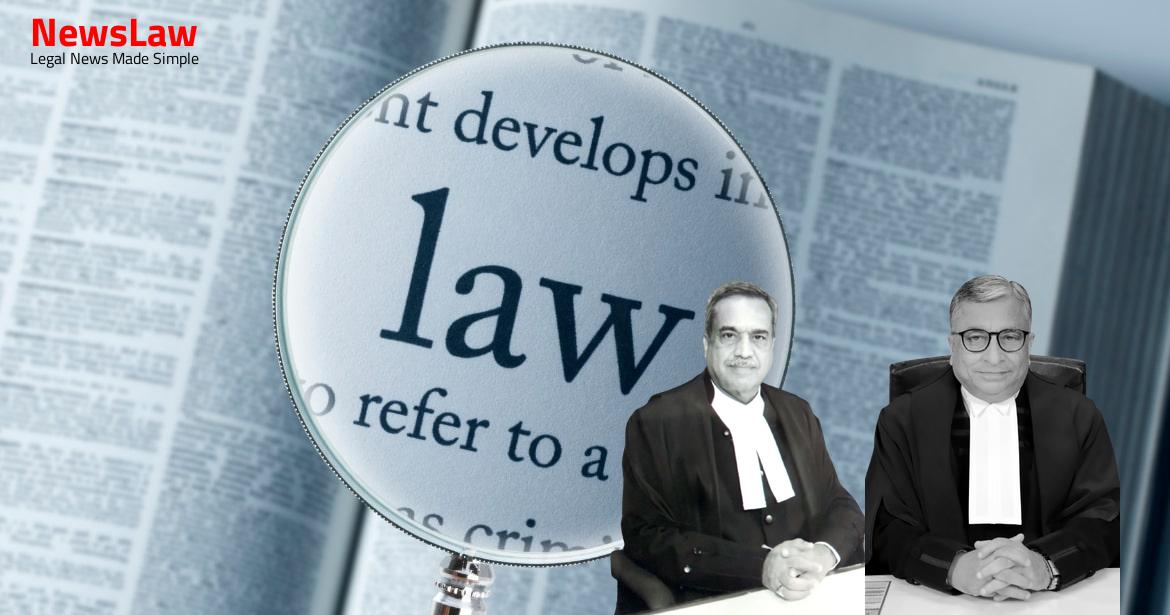The court’s legal analysis in a recent case sheds light on the classification of roles in State Universities, emphasizing the importance of reasonableness and non-arbitrariness in administrative decisions. The judgment delves into the nuances of classification, highlighting the need for a clear rationale and objective basis for such distinctions. This summary focuses on the court’s detailed examination of the case, offering insights into the principles guiding judicial review of administrative actions. Stay informed on the intricacies of legal analysis and administrative decision-making in this compelling summary.
Facts
- The State of Uttarakhand sent a requisition for the appointment of Registrars in State Universities.
- The pay scale of Respondent No 1 was revised on the recommendation of the Sixth Pay Commission.
- Government of India published communications regarding the revision of pay scales for Lecturers and Administrative Staff.
- Section 16 of the Uttar Pradesh State Universities Act, 1973 deals with the post of Registrar.
- Circulars issued by the Government of India were meant for Central Government Universities, becoming recommendations for State Government Universities.
- Respondent No 1 challenged the Government Order as unconstitutional.
- The State Universities Act, 1973 of Uttar Pradesh was adopted by Uttarakhand.
- Kumaon University requested the Higher Education Department for the petitioner’s pay scale fixation.
- The High Court allowed the writ petition based on a factual error
- The decision was misconstrued in favor of teaching faculty instead of Registrar and administrative staff
- High Court directed Principal Secretary, Higher Education of Uttarakhand to review a letter from Kumaon University
- By the order dated 27.02.2012, High Court directed Pay Anomaly Committee to reexamine the case
- Committee found no justification for respondent’s claim due to qualifications discrepancy
Also Read: Supreme Court Judgment on Single Till Mechanism for HRAB Calculation: A Comprehensive Analysis
Arguments
- The decision was made to revise the pay scales of lecturers but not of registrars
- Economic implications need to be considered
- Learned counsel for the Appellant argues that the High Court misunderstood the admitted facts
- There are two circulars dealing with lecturers and registrars
Analysis
- The UGC Regulations, 2010 are partly mandatory and partly directory for universities and colleges under State legislation.
- A claim based on legitimate expectation alone does not give a right.
- The State of Uttarakhand accepted revised pay scales for teaching faculties as per Central Government Colleges, except for superannuation age issues.
- The High Court Case involved Respondent No 1 seeking pay scale parity with Central Universities.
- Reasonable classification is allowed by the Court when based on exigencies and diverse situations.
- Courts should not unnecessarily interfere with administrative authorities’ expertise.
- Illegality, not governance, is the focus of the court’s role.
- The classification must not create inequality among similarly placed persons, and an interference is warranted only in such cases.
- Temporary job assignment does not confer permanent rights.
- Revised pay scales for Lecturers do not automatically extend to Registrars.
- Legal expectations must have a foundation in the law to be considered legitimate.
- Policy decisions by the State are given a wider latitude of acceptance by the Court.
- A mere differential treatment does not violate Article 14 if a just and fair classification exists.
- The court should consider the avowed object behind a classification in determining its reasonableness.
- Judges’ preferences should be minimized in adjudication within legal constraints.
- Mere differentiation does not equate to discrimination under the guarantee of equality.
- Classification in favor of specific classes is permissible based on social, revenue, and economic considerations.
- The Appellant is not bound by Central Government directions for State Universities unless specifically accepted.
- Court misinterpretation of facts may lead to incorrect conclusions.
- Existence of a reasonable basis prevents violation of Article 14.
- Legal rights must correspond to a specific duty for relief to be sought.
- Reasonable classification under Article 14 requires intelligible differentia and a rational relation to the object sought.
- Judges should respect the wisdom of the executive unless classification edges towards arbitrariness.
- Valid classification is a form of valid discrimination as long as it is not arbitrary.
- No mandatory compliance for Central Government’s pay scales in State Universities.
- Policy decisions considering economic implications are generally not subject to judicial review.
- Respondent No 1’s role as a Lecturer for a period does not automatically entitle him to higher pay scale.
- The initial burden of proving violation of Article 14 & 16 rests with the appellants.
- The definition of ‘teachers’ under the Act includes various categories of academic staff.
- The determination of whether the impugned action is arbitrary depends on the specific facts of each case.
- Legitimate expectation is a question of fact to be determined on a case-by-case basis.
- Judicial notice can be taken of variations in retirement ages across different services.
- Classification by experts should be respected unless there are strong reasons to believe it is unreasonable.
- Inequality among different groups may preclude the application of ‘equal pay for equal work’ principle.
- Arbitrariness, although challenging to define precisely, is a key consideration under Article 14.
- State actions must be evaluated for fairness and non-arbitrariness, as mandated by the Rule of Law.
- Judges must exercise judicial self-restraint in reviewing administrative or legislative decisions.
- Equality under Article 14 requires fairness and non-arbitrariness in state actions.
- Courts should defer to administrators’ judgment in administrative matters unless clear violations are evident.
- The principle of ‘equal pay for equal work’ has been scrutinized by the court in relevant cases.
- Discernible principles and reasonableness are essential factors in evaluating administrative actions.
- Courts should intervene only in extreme cases where decisions are not based on reason or are shockingly arbitrary.
- Changes in policy should be made fairly and not arbitrarily, in line with Article 14 requirements.
- Judicial intervention in administrative policy should occur only when statutory provisions are violated or the decision is unreasonable.
- A high burden lies on applicants to demonstrate overwhelming reasons for court intervention in policy matters.
- Classification of roles as Registrar and Lecturer is an administrative convenience due to a contingency
- Clear and distinct classification is justified with a rationale and relation to the objective
- No reason to treat Registrar at par with Lecturers as they serve different purposes – administration and teaching respectively
Also Read: Selection and Appointment of Judicial Officers in Himachal Pradesh
Decision
- The High Court did not consider the financial implications of the decision on the administrative staff as a whole.
- The decision was based on a wrong understanding of facts.
- The decision has been set aside by allowing Civil Appeal No. 2661 of 2015.
- The writ petition filed stands dismissed with no costs incurred.
Case Title: STATE OF UTTARAKHAND Vs. SUDHIR BUDAKOTI (2022 INSC 401)
Case Number: C.A. No.-002661-002661 / 2015



